- Home
- Sarah Dessen
The Truth About Forever
The Truth About Forever Read online
Table of Contents
Title Page
Copyright Page
Dedication
Chapter One
Chapter Two
Chapter Three
Chapter Four
Chapter Five
Chapter Six
Chapter Seven
Chapter Eight
Chapter Nine
Chapter Ten
Chapter Eleven
Chapter Twelve
Chapter Thirteen
Chapter Fourteen
Chapter Fifteen
Chapter Sixteen
Chapter Seventeen
Chapter Eighteen
Chapter Nineteen
Chapter Twenty
Chapter Twenty-One
Chapter Twenty-Two
Teaser chapter
The wish way
“All in all,” Delia said three hours later, as we slid the last cart, now loaded down with serving utensils and empty coolers, into the van, “that was not entirely disastrous. In fact, I’d even go so far as to say it was half-decent.”
“There was that thing with the steaks,” Kristy said, referring to a panicked moment right after we distributed the salads, when Delia realized that half the fillets were still in the can and, therefore, ice cold.
“Oh, right. I forgot about that.” Delia sighed. “Well, at least it’s over. Next time, everything will go smoothly. Like a well-oiled machine.”
Even I, as the newbie, knew this was unlikely. All night there’d been one little problem after another, disasters arising, culminating, and then somehow getting solved, all at whiplash speed. I was so used to controlling the unexpected at all costs that I’d felt my stress level rising and falling, reacting constantly. For everyone else, though, this seemed perfectly normal. They honestly seemed to think that things would just work out. And the weirdest thing was, they did. Somehow. Eventually. Although even when I was standing right there I couldn’t say how.
Also by SARAH DESSEN
THAT SUMMER
SOMEONE LIKE YOU
KEEPING THE MOON
DREAMLAND
THIS LULLABY
JUST LISTEN
SPEAK
Published by the Penguin Group
Penguin Group (USA) Inc.,
345 Hudson Street, New York, New York 10014, U.S.A.
Penguin Group (Canada), 90 Eglinton Avenue East, Suite 700, Toronto,
Ontario, Canada M4P 2Y3 (a division of Pearson Penguin Canada Inc.)
Penguin Books Ltd, 80 Strand, London WC2R 0RL, England
Penguin Ireland, 25 St Stephen’s Green, Dublin 2, Ireland
(a division of Penguin Books Ltd)
Penguin Group (Australia), 250 Camberwell Road, Camberwell, Victoria 3124, Australia
(a division of Pearson Australia Group Pty Ltd)
Penguin Books India Pvt Ltd, 11 Community Centre, Panchsheel Park,
New Delhi - 110 017, India
Penguin Group (NZ), Cnr Airborne and Rosedale Roads, Albany, Auckland 1310,
New Zealand (a division of Pearson New Zealand Ltd)
Penguin Books (South Africa) (Pty) Ltd, 24 Sturdee Avenue,
Rosebank, Johannesburg 2196, South Africa
Registered Offices: Penguin Books Ltd, 80 Strand, London WC2R 0RL, England
First published in the United States of America by Viking,
a division of Penguin Young Readers Group, 2004
Published by Speak, an imprint of Penguin Group (USA) Inc., 2006
9 10
Copyright © Sarah Dessen, 2004
All rights reserved
CIP Data is available.
eISBN : 978-0-142-40625-0
The publisher does not have any control over and does not assume any
responsibility for author or third-party Web sites or their content.
http://us.penguingroup.com
For Jay, as ever, and for my cousins
who, like me, know by heart the view
of the river and the bay,
the complex rules of Beckon,
and all the ways you Can’t Get to Heaven
to name you all would be a book in itself:
you know who you are.
Chapter One
Jason was going to Brain Camp. It had another name, a real name, but that’s what everyone called it.
“Okay,” he said, wedging a final pair of socks along the edge of his suitcase. “The list. One more time.”
I picked up the piece of paper beside me. “Pens,” I said. “Notebooks. Phone card. Camera battery. Vitamins.”
His fingers moved across the contents of the bag, finding and identifying each item. Check and double-check. With Jason, it was always about being sure.
“Calculator.” I continued, “Laptop. . . .”
“Stop,” he said, putting up his hand. He walked over to his desk, unzipping the slim black bag there, then nodded at me. “Skip down to list number two.”
I scanned down the page, found the words LAPTOP (CASE), and cleared my throat. “Blank CDs,” I said. “Surge protector. Headphones. . . .”
By the time we’d covered that, then finished the main list— stopping to cover two other sub-headings, TOILETRIES and MIS-CELLANEOUS—JASONSEEMED pretty much convinced he had everything. Which did not, however, stop him from continuing to circle the room, mumbling to himself. It took a lot of work to be perfect. If you didn’t want to break a sweat, there was no point in even bothering.
Jason knew perfect. Unlike most people, for him it wasn’t some distant horizon. For Jason, perfect was just over the next hill, close enough to make out the landscape. And it wasn’t a place he would just visit. He was going to live there.
He was the all-state math champ, head of the debate team, holder of the highest GPA in the history of our high school (he’d been taking AP classes since seventh grade, college sections since tenth), student council president two years running, responsible for an innovative school recycling program now implemented in districts around the country, fluent in Spanish and French. But it wasn’t just about academics. Jason was also a vegan and had spent the past summer building houses for Habitat for Humanity. He practiced yoga, visited his grandmother in her rest home every other Sunday, and had a pen pal from Nigeria he’d been corresponding with since he was eight years old. Anything he did, he did well.
A lot of people might find this annoying, even loathsome. But not me. He was just what I needed.
I had known this from the first day we met, in English class sophomore year. We’d been put into groups to do an assignment on Macbeth, me and Jason and a girl named Amy Richmond who, after we pulled our desks together, promptly announced she was “no good at this Shakespeare crap” and put her head down on her backpack. A second later, she was sound asleep.
Jason just looked at her. “Well,” he said, opening his textbook, “I guess we should get started.”
This was right after everything happened, and I was in a silent phase. Words weren’t coming to me well; in fact I had trouble even recognizing them sometimes, entire sentences seeming like they were another language, or backwards, as my eyes moved across them. Just printing my own name on the top of a page a few days previously, I’d second-guessed the letters and their order, not even sure of that anymore.
So of course Macbeth had totally mystified me. I’d spent the entire weekend struggling with the antiquated language and weird names of the characters, unable to even figure out the most basic aspects of the story. I opened my book, staring down at the lines of dialogue: Had I but died an hour before this chance/I had liv’d a blessed time; for, from this instant,/ there’s nothing serious in mortality:/all is but toys.
Nope, I thought. Nothing.
I nodded. All around us I could hear our classmates chattering, the tired voice of our English teacher, Mr. Sonnenberg, telling us again to please settle down.
Jason skipped down a few lines on his page. Murder, I watched him write. His handwriting was clean, block-style, and he moved across the page quickly. Power. Marriage. Revenge. Prophecy. Politics. It seemed like he could go on forever, but then he stopped and looked at me. “What else?” he asked.
I glanced back down at my book, as if somehow, the words there would suddenly form together into something coherent. I could feel Jason looking at me, not unkindly, just waiting for me to contribute.
“I don’t . . .” I said finally, then stopped, the words sticking. I swallowed, then started over. “I don’t understand it. Actually.”
I was sure, hearing this, he’d shoot me the same look he’d given Amy Richmond. But Jason surprised me, putting down his pen. “Which part?”
“Any of it,” I said, and when he didn’t roll his eyes as I’d been expecting, I added, “I mean, I know there’s a murder plot and I know there’s an invasion but the rest . . . I don’t know. It’s totally confusing.”
“Look,” he said, picking up his pen again. “It’s not as complicated as you think. The key to really understanding is to start with the prophecy about what’s going to happen . . . see, here. . . .” He started flipping pages in his book, still talking, and pointed out a passage to me. Then he read it aloud, and as his finger moved across the words it was like he changed them, magic, and suddenly they made sense.
And I felt comfort. Finally. All I’d wanted for so long was for someone to explain everything that had happened to me in this same way. To label it neatly on a page: this leads to this leads to this. I knew, deep down, it was more complicated than that, but watching Jason, I was hopeful. He took the mess that was Macbeth and fixed it, and I had to wonder if he might, in some small way, be able to do the same for me. So I moved myself closer to him, and I’d been there ever since.
Now, he zipped up his laptop case and put it on the bed with the rest of his stuff. “Okay,” he said, taking one last glance around the room. “Let’s go.”
His mom and dad were already in their Volvo when we came outside. Mr. Talbot got out, opened the trunk, and he and Jason took a few minutes getting everything situated. As I got in the backseat and put on my seatbelt, Mrs. Talbot turned around and smiled at me. She was a botanist, her husband a chemist, both of them professors. They were so scholarly that every time I saw either of them without a book in their hands they looked weird to me, as if they were missing their noses, or their elbows.
I tried not to think about this as she said, “So, Macy. What are you going to do until August without Jason?”
“I don’t know,” I said. I was working at the library, taking over Jason’s job at the information desk, but other than that, the next eight weeks were just looming ahead, empty. While I had a few friends from student council, most had gone away for the summer themselves, to Europe or camp. To be honest, Jason’s and my relationship was pretty time consuming: between yoga classes and student government stuff, not to mention all the causes we dealt with, there just hadn’t been much time for anyone else. Besides, Jason got easily frustrated with people, so I’d been hesitant to invite new people out with us. If they were slow, or lazy in any way, he lost patience fast, and it was just easier to hang out with him, or with his friends, who could keep up with him. I’d never really thought about this as a bad thing, actually. It was just how we were.
On the way to the airport, Jason and his dad discussed some elections that had just happened in Europe; his mom fretted about construction traffic; and I sat there, looking at the inch between Jason’s knee and mine and wondering why I didn’t try to move closer to him. This wasn’t new. He hadn’t even kissed me until our third date, and now, after a year and a half, we still hadn’t discussed going all the way. At the time we met, someone just hugging me still felt like too much to bear. I didn’t want anyone to get too close. So this had been all I wanted, a boy who understood how I felt. Now, though, I sometimes wished for more.
At the airport, we said good-bye at the gate. His parents hugged him, then discreetly walked across the waiting room to stand at the window there, looking out at the runway and the big stretch of blue sky that hung over it. I put my arms around Jason, breathing in his smell—sport stick deodorant and acne cleanser—deeply, so I’d get enough to last me awhile.
“I’m going to miss you,” I told him. “So much.”
“It’s only eight weeks,” he said.
He kissed me on the forehead. Then, quickly, so quickly I didn’t even have time to react, on the lips. He leaned back and looked at me, tightening his arms around my waist.
“I’ll email you,” he said, and kissed me on the forehead again. As they called his flight and he disappeared down the hallway to the plane, I stood with the Talbots and watched him go, feeling a tug in my chest. It was going to be a long summer. I’d wanted a real kiss, something to remember, but I’d long ago learned not to be picky in farewells. They weren’t guaranteed or promised. You were lucky, more than blessed, if you got a good-bye at all.
My dad died. And I was there.
This was how people knew me. Not as Macy Queen, daughter of Deborah, who built pretty houses in brand new cul-de-sacs. Or as sister of Caroline, who’d had just about the most beautiful wedding anyone had ever seen at the Lakeview Inn the previous summer. Not even as the one-time holder of the record for the fifty-yard dash, middle school division. Nope. I was Macy Queen, who’d woken up the day after Christmas and gone outside to see her father splayed out at the end of the road, a stranger pumping away at his broad chest. I saw my dad die. That was who I was now.
When people first heard this, or saw me and remembered it, they always made that face. The one with the sad look, accompanied by the cock of the head to the side and the softening of the chin—oh my goodness, you poor thing. While it was usually well intentioned, to me it was just a reaction of muscles and tendons that meant nothing. Nothing at all. I hated that face. I saw it everywhere.
The first time was at the hospital. I was sitting in a plastic chair by the drink machine when my mother walked out of the small waiting room, the one off the main one. I already knew this was where they took people to tell them the really bad news: that their wait was over, their person was dead. In fact, I’d just watched another family make this progression, the ten or so steps and the turn of a corner, crossing over from hopeful to hopeless. As my mother—now the latter—came toward me, I knew. And behind her there was this plump nurse holding a chart, and she saw me standing there in my track pants and baggy sweatshirt, my old smelly running shoes, and she made the face. Oh, poor dear. Then though, I had no idea how it would follow me.
I saw The Face at the funeral, everywhere. It was the common mask on the people clumped on the steps, sitting quietly murmuring in the pews, shooting me sideways looks that I could feel, even as I kept my head down, my eyes on the solid black of my tights, the scuffs on my shoe. Beside me, my sister Caroline sobbed: through the service, as we walked down the aisle, in the limo, at the cemetery, at the reception afterward. She cried so much it seemed wrong for me to, even if I could have. For anyone else to join in was just overkill.
I hated that I was in this situation, I hated that my dad was gone, I hated that I’d been lazy and sleepy and had waved him off when he’d come into my room that morning, wearing his smelly Waccamaw 5K shirt, leaning down to my ear to whisper, Macy, wake up. I’ll give you a head start. Come on, you know the first few steps are the hardest part. I hated that it had been not two or three but five minutes lat
er that I changed my mind, getting up to dig out my track pants and lace my shoes. I hated that I wasn’t faster on those three-tenths of a mile, that by the time I got to him he was already gone, unable to hear my voice, see my face, so that I could say all the things I wanted to. I might have been the girl whose dad died, the girl who was there, and everyone might have known it. Like so much else, I could not control that. But the fact that I was angry and scared, that was my secret to keep. They didn’t get to have that, too. It was all mine.
When I got home from the Talbots’, there was a box on the porch. As soon as I leaned over and saw the return address, I knew what it was.
“Mom?” My voice bounced down the empty front hall as I came inside, bumping the door shut behind me. In the dining room, I could see fliers stacked around several floral arrangements, everything all set for the cocktail reception my mother was hosting that night. The newest phase of her neighborhood, luxury townhouses, was just starting construction, and she had sales to make. Which meant she was in full-out schmooze mode, a fact made clear by the sign over the mantel featuring her smiling face and her slogan: Queen Homes—Let Us Build Your Castle.
I put the box on the kitchen island, right in the center, then walked to the fridge and poured myself a glass of orange juice. I drank all of it down, rinsed the cup, and put it in the dishwasher. But it didn’t matter how I busied myself. The entire time, I was aware of the box perched there waiting for me. There was nothing to do but just get it over with.
I pulled a pair of scissors out of the island drawer, then drew them across the top of the box, splitting the line of tight brown packing tape. The return address, like all the others, was Waterville, Maine.
Dear Mr. Queen,
As one of our most valued EZ Products customers, please find enclosed our latest innovation for your perusal. We feel assured that you’ll find it will become as important and time-saving a part of your daily life as the many other products you’ve purchased from us over the years. If, however, for some reason you’re not completely satisfied, return it within thirty days and your account will not be charged.

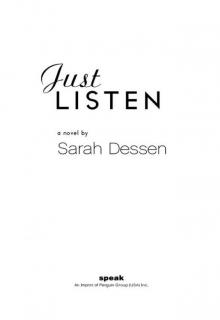 Just Listen
Just Listen Along for the Ride
Along for the Ride This Lullaby
This Lullaby Once and for All
Once and for All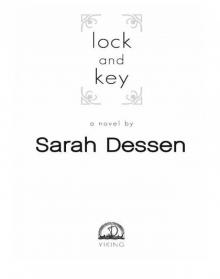 Lock and Key
Lock and Key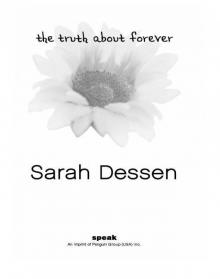 The Truth About Forever
The Truth About Forever Someone Like You
Someone Like You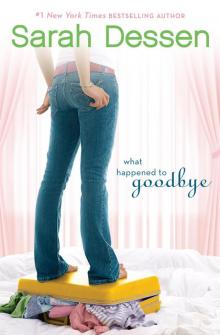 What Happened to Goodbye
What Happened to Goodbye Dreamland
Dreamland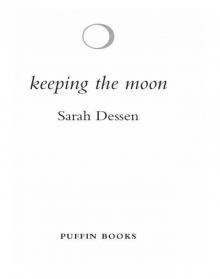 Keeping the Moon
Keeping the Moon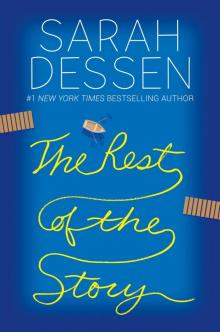 The Rest of the Story
The Rest of the Story The Moon and More
The Moon and More What Happens to Goodbye
What Happens to Goodbye